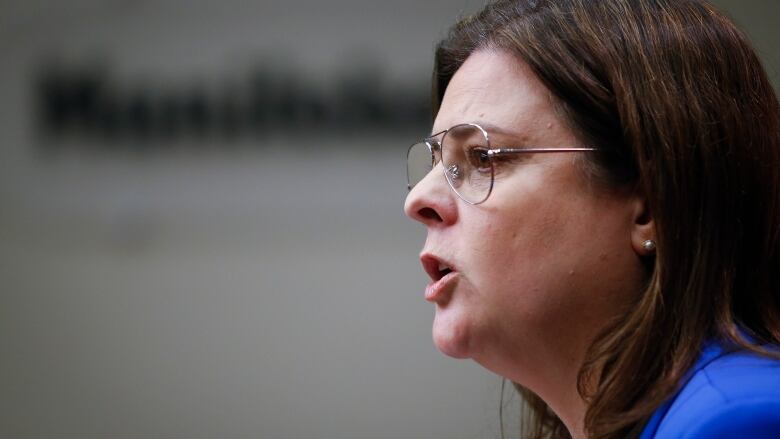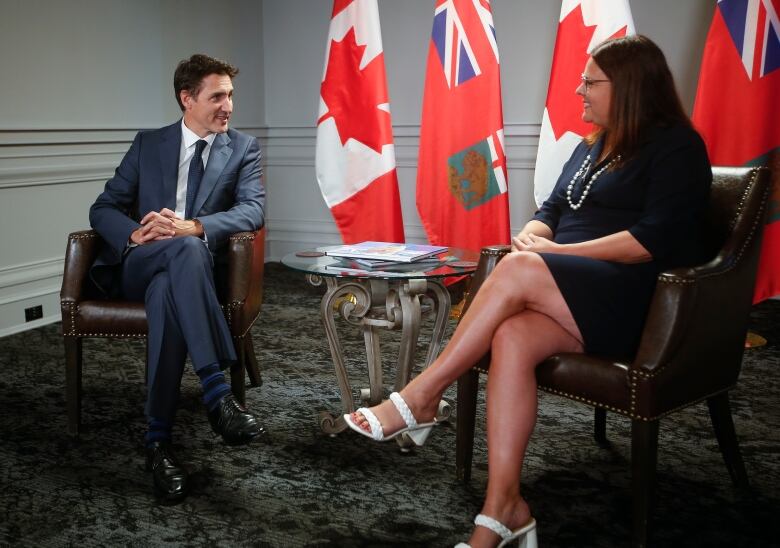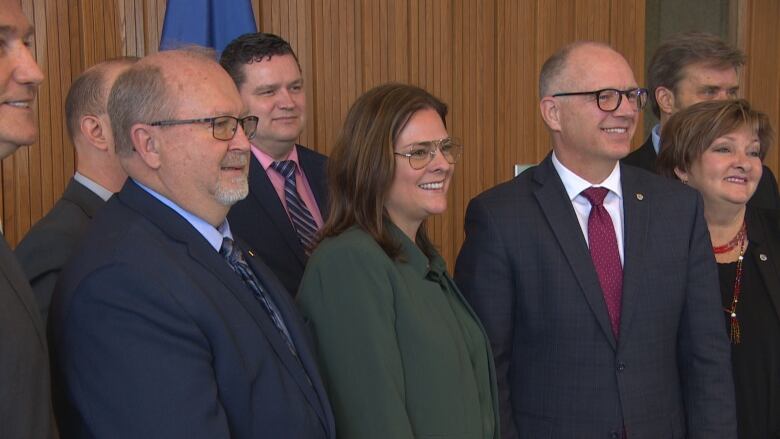When Manitoba's very model of a moderate PC premier put on a carbon tax warrior's populist skin
Heather Stefanson ups the rhetorical ante by characterizing inflation-fighting cheques as 'carbon tax relief'

With tax revenue on the rise and federal transfers on the way up, Manitoba'sfinancial picturelooksa lot sunnier than it did six weeks ago.
In mid-December, thefederal government revealed equalization payments to this province will rise $577 million this year.
Now, provincial finance officials say income and sales tax revenue is pouring in above budget expectations. Manitobaexpectsto rake in an additional$573 million during the fiscal year that endsMarch 31.
Together, these heightenedtransfers and taxes are worth almost $1.2 billion for Manitoba. Whoever becomes Manitoba's next finance minister Cameron Friesen announced Friday he will soon resignto seek a federal nomination will have a much better shot of balancing the budget for the coming year.
It's not clear whether that's a bigpriority for Heather Stefanson's Progressive Conservative government.
There are typically four things governments can do with additional revenue: whittle down adeficit,pay off long-term debt, increase spending on programs or offer tax cuts.
While these options are not mutually exclusive, Stefanson's PCs have in effect already gone the tax-cut route. The cheques heading to most Manitobans at the end of the month amount to tax rebates for 90 per cent of the provincial population.
This government is planningeven more tax cuts in the coming budget, as the PCs still planto boost the education tax rebate from 37.5 per cent in 2022 to 50 per cent this year.
Early in this election year, affordability measures are emerging as apriority for this government.Stefansonalso demonstrated this week she has another priority: throwing red meat to a segment of the party base that may be tempted to stayhome when election day rolls around.

On Thursday, when the premier announced she set aside $200 million to dole out the affordability cheques, she called thispot of money a "carbon tax relief fund."
Stefansoninsists the federal program is a net financial burden for most Manitobans. Indoing so, she suggeststhe federal carbontax as opposed to global supply demands, war abroad and domestic spending is the primary reason the cost of living is on the rise.
"We now know this is taking more money than what they're giving back, and that is not helping when people are struggling to make ends meet," the premier said Friday outside the office of Winnipeg's mayor.
"We're going to give some money back in the way of the carbon tax relief. If the federal government isn'tgoing to do it and Justin Trudeau is not going to doit, we're doingit."
Populist rhetoric uncharacteristic
When politicians such as Conservative LeaderPierre Poilievre, Alberta Premier Danielle Smith or Saskatchewan Premier Scott Moe beat up on carbon taxes, thepopulist rhetoric comes across as natural.
Populism, however, is not Stefanson'susual brand. She'sbetter known as a moderate and a diplomat.
Compared to her predecessor, Brian Pallister, this premier has taken large and deliberatestrides toward mending strained relationships between her government and both Indigenous and municipal leaders.
On Friday, for example, she convinced several members of her cabinet to engage in a photo op with Winnipeg's mayor at city hall. That sort of thing was unheard of during Pallister's time in office.

Stefanson has nonetheless picked up Pallister's disdain for the carbon tax and attempted to incorporate it into her own brand.
"This is symbolism on display here," said Paul Thomas, a professor emeritus of political studies at the University of Manitoba.
"The carbon taxhas been quite unpopular with conservative supporters and there's been an ongoing campaign by the premiers, including our own premier, to have the federal government pause the carbon tax to relieve some of the inflationary pressures."
To Thomas, Stefanson'sattempt to use the carbon tax as a punching bag is merely a public relations ploy.
To David McLaughlin, a green economy proponentwho was dismissed by Stefansonas Manitoba's top public servant, the premier's rhetoric is simply illogical.
McLaughlin argues Manitoba's "carbon tax relief fund" does not function the way it is named.
"It should rise each year with the increasing federal carbon tax.Not just a one-time affair. It doesn't," he said on Twitter after Stefanson told most Manitobansto expect affordability cheques in the mail.
"It should be a rebate of a provincial carbon tax passed back in the form of equivalent tax relief or payments."
Odd. If truly a carbon tax relief cheque:
1. It should rise each year with the increasing federal carbon tax. Not just a one-time affair. It doesn't.
2. It should be a rebate of a provincial carbon tax passed back in the form of equivalent tax relief or payments. #mbpoli https://t.co/Uwp9qudVxI
—@DavidMcLAThere is, however, no provincial carbon tax or any othereffort to de-incentivize the use of fossil fuels.
Successive NDP and PC governments promised made-in-Manitoba efforts to combat climate change but never followed through on their plans. There was very little mention of climate change at all in the most recent provincial budget.
Bolstered by additional revenue, Manitoba may have the fiscal ability to institute some form of green economy reforms during this year's budget.
Just don't count on that being a big priority for this government during an election cycle where the most complex policy position to date involves placing cheques inside envelopes and sending them on their way.












_(720p).jpg)


 OFFICIAL HD MUSIC VIDEO.jpg)
.jpg)



























































































